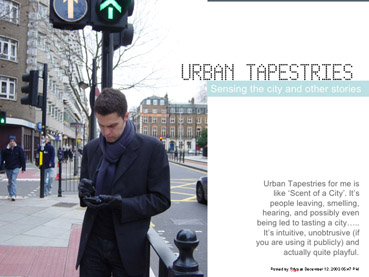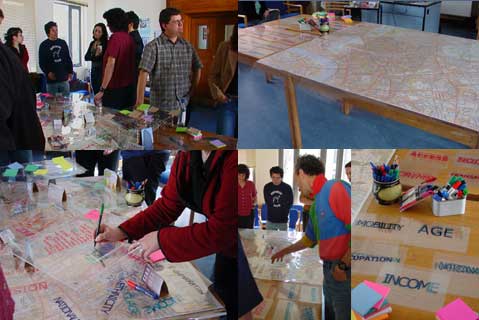Nick presented Urban Tapestries, and I took part in a panel discussion at Cybersalon's Mobile Futures event at the new Dana Centre on Thursday evening. The other panel members were James Woodhuysen (Professor of Forecasting and Innovation, De Montfort University) and Paul Amery (Partner Strategy Manager, Orange) with Richard Barbrook (Hypermedia Research Centre).

Nick & I participated in the Creative Crossings Seminar at the Finnish Institute in London on Monday and Tuesday. It was organised by m-cult, banff centre and arts council england to bring together practitioners from Britain, Canada and Finland with an aim of exploring key research criteria and how to build transnational networks of collaboration.
I was asked by one of the organisers, Minna Tarka, to make some opening remarks on the theme of 'location, locatedness and locative media' to stimulate the first day's debate with Marc Tuters of the Locative Media Network.
The two days were framed by intensive discussions and debates around concepts of sharing and openness, place and location, culture and society, practice and ideology. Anne Galloway has an excellent summary here.
I presented a paper at the Digiplay seminar convened by Dr Nicola Green at University of Surrey yesterday. The seminar entitled 'Mobile Leisure and the Technological Mediascape' was the second in a series of six run by the CRIC and funded by the ESRC. The seminar fostered a wonderfully open atmosphere where speakers were encouraged to discuss work in progress ideas and there was a provocative mix of multi-discplinary approaches and mobile leisure technology projects.
My paper was called Urban Tapestries; Sensing the city and other stories and it drew from de Certeau's writings on Walking in the City (1998) and from the posts on the weblog from participants of the December trial.

Hello there,
Iwas browsing the web and found this blog. Some interesting quotes. Keep them coming!
Alice
eliminate debt uk
As part of the Life of Mobile Data Conference at the University of Surrey, I convened and chaired a panel session which looked very broadly at transdiciplinary research models in this area of mobile culture.
The panelists were each drawn from a different area of practice currently engaged in exploring and developing mobile projects: Linda Doyle (dept of Electrical Engineering at Trinity College Dublin); Constance Fleuriot (Mobile Bristol Project, Computer Science Dept, University of Bristol); Chris Heathcote (Interaction Designer, Orange UK) & Nick West (Information Architect & Researcher, Goldsmiths College & Proboscis).
Panel Theme:
The paradox of discussing 'mobile data' is how to avoid treating it as a static entity when by its very meaning it is transient, fluid and elusive. What might this data be that is 'mobile'; what might be mobile about such 'data'? Could it be that the mobile element is not the data itself but us the users/creators/subjects/objects endlessly reconfiguring the moments and spaces when we access it?
The recent interest in pervasive networks, ubiquitous computing and geo-specific (or location-based) information has been largely focused on the technology rather than why we might want or need such systems and what we might do with them. Recent projects, such as Urban Tapestries, have sought to bridge these social and cultural issues with technical development, creating transdisciplinary models which bring analytical and practical research together for a richer understanding of the forces shaping mobile technologies, and shaped by them.
This panel will discuss the implications of transdisciplinary models and experimental methodologies for understanding, and creatively responding to, our emerging interactions with 'mobile data'.

As part of our ongoing research into the social and cultural uses of 'public authoring' via pervasive mobile technologies we held a new Bodystorming event around broad issues of 'neighbourliness', at the LSE last Friday. An invited group of 10 people took part from civil society, technology research, creative, artistic and academic backgrounds, interested in investigating the social and cultural potential of emerging mobile technologies in social situations.
The participants were:
Will Davies (iSociety), Steve Dietz (Freelance Curator), Gordon Gow (Media@LSE), Kevin Harris (Community Development Foundation), Michelle Kent (Creative Partnerships Hull), Laurence Kovacocy (France Telecom R&D), Joyce Majiski (artist, Canada), Graziano Milano (The Public), Sherrie-Lee Samuel (Ordnance Survey), Loz Wilson (Kingswood School, Hull).
It was facilitated by Alice Angus, Giles Lane, Sarah Thelwall & Nick West (Proboscis) and Victoria Peckett & Zoe Sujon (Media@LSE).
The event sketched out the various boundaries, barriers and parameters of 'communities' within a defined geographic area, and explore how technologies like Urban Tapestries might be used to transcend them for social and cultural benefit.
Dividing into three groups, we each explored one of the three issues of; neighbourliness, social capital in the public commons and community reportage; thinking about how a system like UT might be used to transcend boundaries and barriers within these contexts.
The aim of the event was partly to help identify key issues with possible future collaborators, as well as existing ones, and will feed into our plans for the Social Tapestries research project. Building on this event we will also be creating a new bodystorming experience for the creative lab in June.
A special eBook of the outcomes of the Bodystorm is available here.